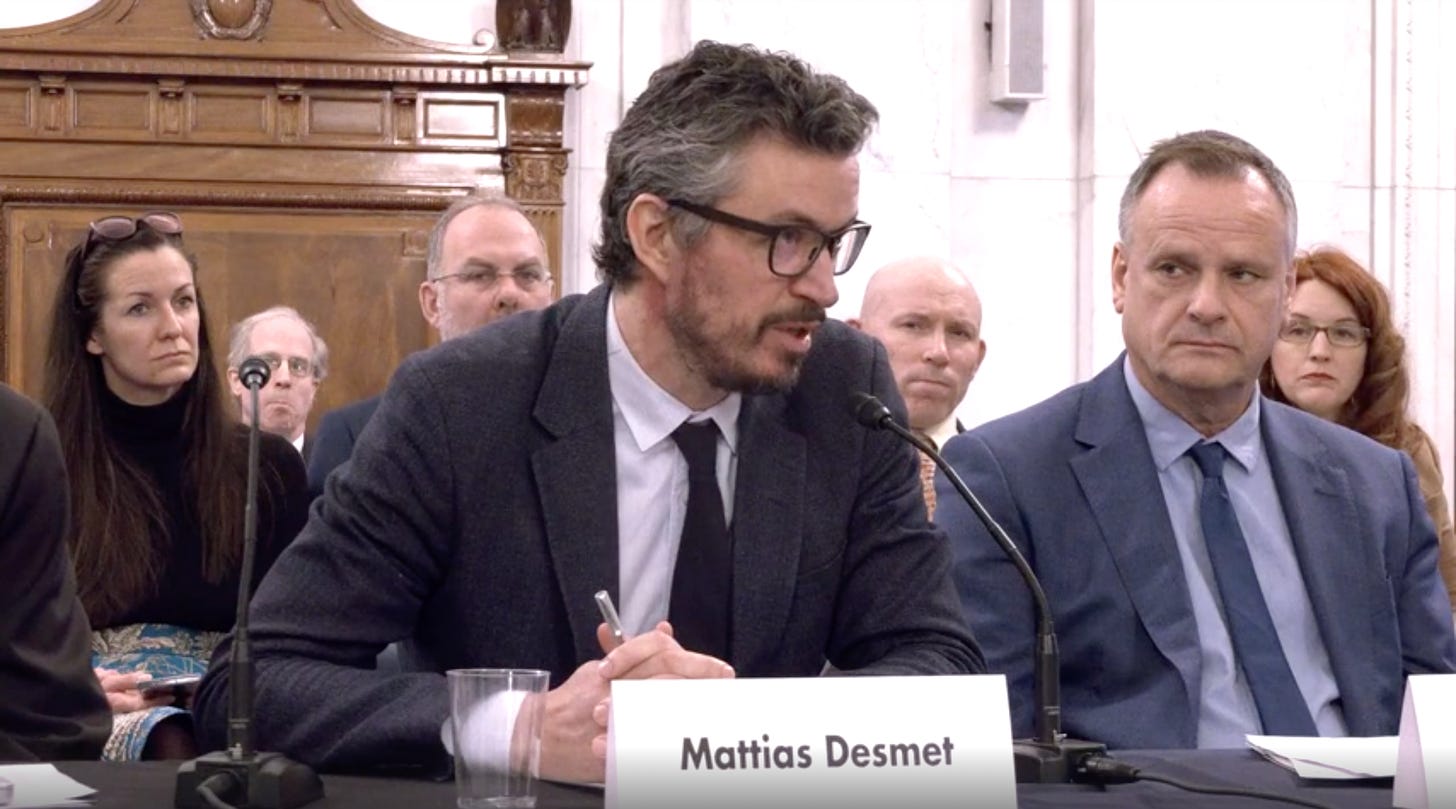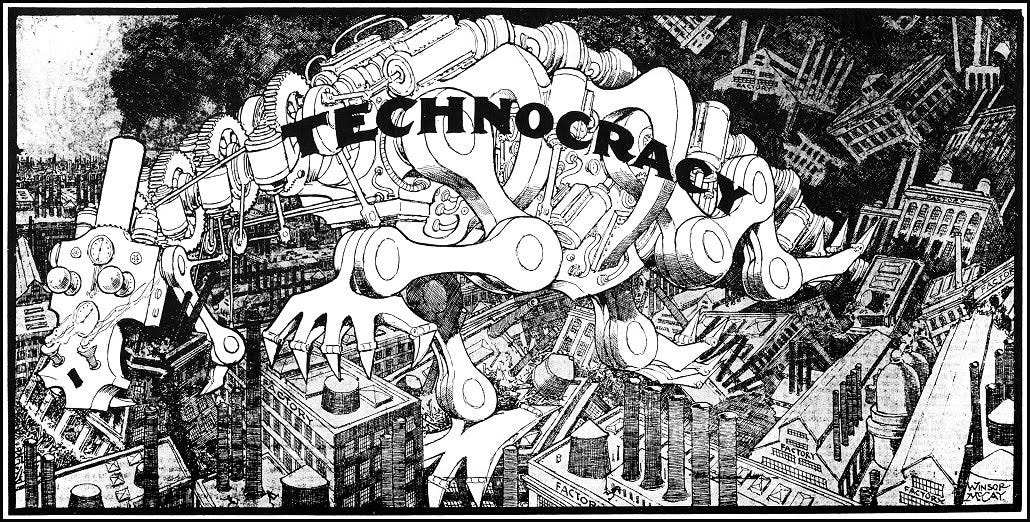How to resist totalitarian control
After laying out his theory of mass formation in 2021, Dr. Mattias Desmet is back to tell us how to break the spell by speaking truthfully and sincerely.

For fans and keen observers of Dr. Mattias Desmet, seeing him back behind the mic — this time, at Senator Ron Johnson’s (R-WI) February 26, 2024 roundtable session in Washington on Federal Health Agencies and the COVID Cartel: What Are They Hiding?” — was a welcome sight indeed. He joined a panoply of heavy hitters who were alternative voices during the pandemic and who have kept up the fight in the ensuing years.
As Desmet explained to the panel yesterday, and as we know from history as recently as 100 years ago, entire societies can fall prey to propaganda. Question is: how is this possible? Many of us have asked ourselves this in recent years as we observed people around us, once logical and level-headed, suddenly appear to lose their grip on reason.
In 2021, Desmet — a clinical psychologist, professor, and author from Belgium — posited a theory.
He said that when people experience free-floating anxiety, frustration, and aggression without being able to connect those feelings to a specific cause, they become susceptible to propaganda and to what he calls ‘mass formation.’ In their fretful and lonely state, they are psychologically primed to attach their emotions to a narrative that offers a proposed object of anxiety (e.g., COVID-19) and a strategy to deal with that object of anxiety (e.g., lockdowns, masks, or vaccine mandates), even if the narrative is completely absurd.
This attachment to a collective narrative gives people a sense of purpose and belonging, alleviating their loneliness. Their lives seem to make sense again. They now know why they feel anxious and have a focal point for their aggression and frustration. Suddenly, they become the hero figure in a proverbial battle against an enemy. They feel connected.
The danger, however, is the connection is not to their fellow citizens but to the state. Desmet warns that mass formation can — and does — lead to the emergence of totalitarianism.
The risks of rationalism
During Senator Johnson’s roundtable, Desmet described how the enlightenment tradition replaced a religious worldview with a materialist one. This led us to believe that rational understanding should guide our society, rather than ethical principles.
That, Desmet says, was a fundamental mistake.
“Such rationalism as is, for instance, conveyed by people like Yuval Noah Hariri always lapses into radical irrationality and that’s what we’re seeing now.”
A world guided by rational understanding is full of hubris, Desmet told the Senator, and can never grasp the essence of life.
“In the end, people lose all ethical awareness and that is exactly what we have seen in every totalitarian system that emerged – whether we are talking about Nazism, Communism, or the contemporary transhumanistic technocratic totalitarianism.”

How today’s mass formation differs from history
Collapse Life had a chance to sit down with Desmet recently and he told us that mass formations have existed for as long as mankind has been around, but modern masses have a different nature than before.
Today we have “lonely masses,” while ancient masses were physical groups that could not form unless they met in person.
Somewhere near the end of the 19th century, the mass media started to emerge in Western society. And these mass media could reach out to all these lonely people who were sitting isolated in their living rooms, and could infuse them with the same narratives, the same mental representations. And that's how the so-called lonely masses emerged…
A physical mass was always very unpredictable, and it was always very dangerous to take the lead of a physical mass. But lonely masses can be much better controlled, much better manipulated, and they continue to exist much, much longer. They can continue to exist for decades, and that's how they are the basis of this completely new type of state system that emerged for the first time in the 20th century.
Mass formations lead to destructive ends
Although a mass formation initially appears to reconnect people, Desmet explains that it actually weakens bonds between individuals because it strengthens collective loyalty. This phenomenon is seen in historical examples such as Stalin's Russia, where collective loyalty and solidarity grew stronger than interpersonal connections.
The same thing has happened in the ongoing COVID-19 pandemic, with loved ones shunning family members who deviate from the state narrative. Despite people becoming more connected to the collective, Desmet says they have less love and solidarity towards each other.
It's crucial to recognize where we stand in this process and find ways to prevent the current mass formation from reaching its end stage, which involves destructive behaviors toward those who do not align with the narrative.
In the end stage of mass formation, people really start to become convinced that it is their ethical duty to destroy each and every person who doesn't go along with the narrative. And that hasn’t happened. Now, people who didn't go along with the narrative were stigmatized, excluded from social life in certain respects, but we are not in the end stage yet. And that's just crucial to realize. It's crucial to realize what we can do to avoid the mass formation going to the end.
Sincere speech is the remedy
What we can do, Desmet says, is to continue to speak out — non-violently — against absurd narratives. Do this even if the effort feels useless. Do this even if the masses do not appear to wake up.
Desmet emphasizes that it is not necessary to convince others, just to articulate your own opinion in a quiet, sincere way. Since mass formations and dehumanization are interconnected, speaking truthfully and authentically can not only keep the mass formation from going deeper, it can also lead to personal growth and evolution.
if you do your best to continue to articulate your voice and your opinion — time and time again — in a quiet way, then you will see that as a human being, you go through a fast process of evolution. You will feel how you need less and less ego and narcissism, and your inner core — what you might call your soul if you want — will become stronger and stronger.
And of course, it's not easy to continue to speak out, and it's not easy to not become a mass ourselves, absolutely not. Because the emergence of a totalitarian state provokes a lot of anxiety in the people who do not go along with it. And they put those people also at risk. And that's exactly the factors under which people show the tendency to become a mass, to cling together and to unify, to identify all with the same opinion and with the same ideology as well. And that's exactly what we should not do.
Desmet argues that genuine, heartfelt communication through truth-speech is the real solution to creating an environment where propaganda doesn’t stand a chance.
We will go through this tipping point where the masses who are in the grip of propaganda, even the most powerful propaganda machine the world has ever seen, become — at the psychological level — less strong than the group who unifies on the basis of this principle of sincere speech.
Desmet encourages individuals to practice sincere speech every day and strive to connect with their inner truth. Ultimately this will create a society based on love and authenticity rather than manipulation and deceit.
Watch our full interview with Mattias Desmet on Rumble or YouTube.


